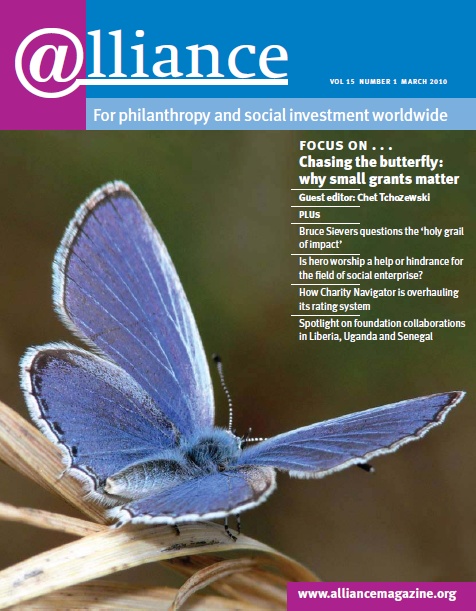With two-thirds of the 70,000 US private foundations having assets of less than $1 million, what value can small foundations bring to international philanthropy? In 2009 the Association of Small Foundations launched an international programme to learn from and educate our members on ways to give globally. We found that small grants to international causes can have a big impact. They also promote the diversity of actors and ideas working in developing countries. Small foundations fill a special niche – and they come with more than money.
Small grants fit
In the developing world, many organizations can benefit from small amounts of funding. First-time international grantmakers are often astonished to learn that a grant of just $15,000 can build a new primary school or dig a well to provide clean water. Experienced grantmakers recognize that small grants are not only cost-effective but also more easily spent in a developing country where small organizations proliferate and a few well-established organizations dominate. A small grant can nurture an emerging organization’s programmes and development at an appropriate level over time.
Appropriate grant size is critical. Many promising organizations have been overwhelmed by the demands of donors who make large grants and insist on significant scale-up while undermining local leadership and community-paced development. Organizations need time to develop their structure and programmes based on internal values and decision-making. In countries without means to provide small amounts of funds, small grants can offer crucial early support for emerging organizations and enterprising individuals with good ideas.
Small grants create diversity
By supporting a wide array of organizations and individual leaders, small grants encourage action and innovation in countries where underinvestment in the social sector is the norm. This pluralism in turn helps build a more dynamic society, with more, and more diverse, people and ideas involved in areas like education, microfinance and HIV prevention.
Foundations that make small grants recognize the risk in funding newer and emerging grantees but they also understand that these organizations and individuals may be the leaders of the future. In addition, some of them support organizations that have existed for several years but receive little or intermittent funding. Many of these community-based organizations continue their work by enlisting community members as volunteers for support services (for instance, HIV groups) or social change (such as women’s rights groups promoting alternatives to female genital mutilation).
Small grants add value
Small foundation grantmakers take a personal stake in their work. They volunteer their time to enhance management systems, document the work and encourage individuals. They leverage their funding through contacts, knowledge and information. Small foundation leaders become champions of local organizations in developing countries, raising funds for them in the US, seeking volunteers and encouraging their leadership. This beyond-dollars support and sense of solidarity is critical, because organizations and individuals often need more than money.
Not all small grants have an impact. The most effective are part of a committed relationship built over several years. Small foundations need to be aware of and connected with leaders and peers in the community, region and nation in which they work. By collaborating with and learning from local experts, community foundations and umbrella organizations, small foundations can be both supporters and catalysts of local leadership and innovation. Those that are successful in doing so should share their experiences and practices with other small foundation leaders.
As Paul Ylvasiker says in his essay Small Can Be Effective, small grants do more than provide financial support: they also serve as platforms for exploring innovative ideas and investing in creative people.
Bill Belding is Director of Corporate and International Programs, Association of Small Foundations. Email bill@smallfoundations.org






Comments (0)